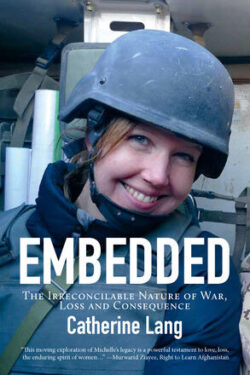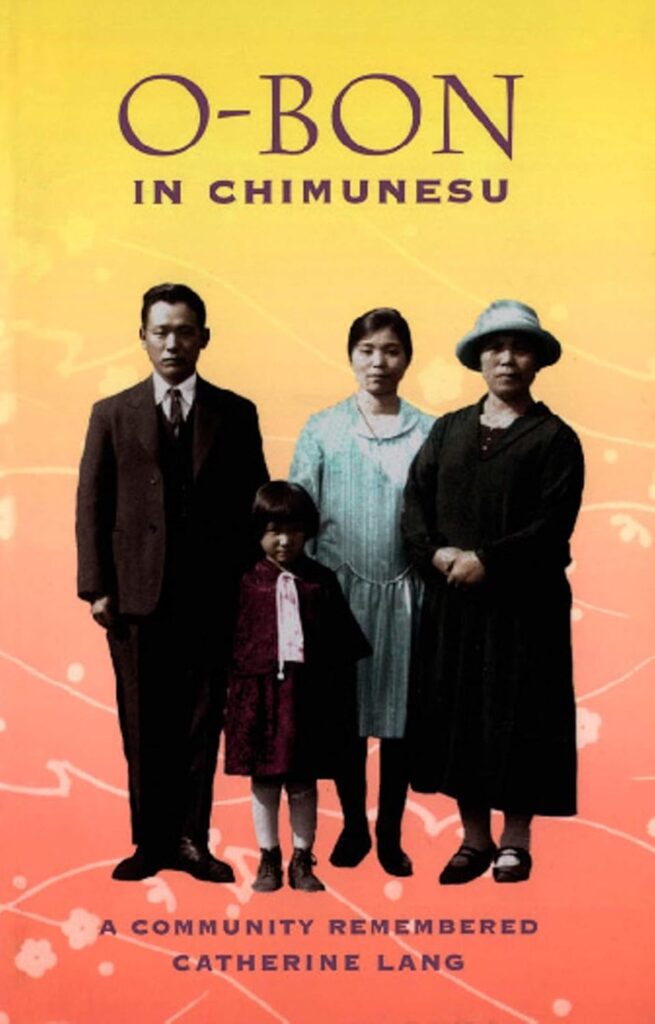Was it all worth it?
Embedded: The Irreconcilable Nature of War, Loss and Consequence
by Catherine Lang
Qualicum Beach: Caitlin Press, 2024
$26 / 9781773861517
Reviewed by Sheldon Goldfarb
*

This book grows on you. At first you may be a bit impatient. You look at the cover and see the smiling face of Michelle Lang wearing a military helmet, embedded as the title says in the Canadian mission to Afghanistan, the only journalist to die on that mission. (You may also wonder at the word “irreconcilable” in the subtitle, thinking what does that mean? but never mind that.)
Anyway, you see all this, and what do you expect? A story about Michelle Lang, an account of her time in Afghanistan (which was actually only a few weeks long) and then a flashback biography about her: how she came to be there, where she was from (Vancouver and other points West), what her life was like, who she was.
And maybe that emerges slowly: Magee High School, the Calgary Herald, some Saskatchewan newspapers, the Langara Journalism School – or wait no, that wasn’t Michelle at Langara; that was her aunt Catherine, the author of this book. The stories get mixed up, intertwined, and first it seems all Catherine, her attempts at journalism, her giving up on journalism, her first child (given up for adoption), her relationship with Michelle’s parents, her hippie-ish past – and you think, No, no, tell me about Michelle, stop confusing me with stories about Catherine.
And then you realize: This story isn’t about Michelle at all. Well, it is the way The Canterbury Tales are about Canterbury: this is a pilgrimage story about going to Canterbury; it’s about the pilgrims, or in this case, one pilgrim, Catherine Lang, and her struggle to make sense of her niece’s death.
And so, we follow Catherine on her journey to meet Michelle’s old friends and her grieving fiancé, and especially her old colleagues from the newspaper world, the world Catherine aspired to and seems to wish she could get back to now, late in life; it’s a bit like Tennyson’s Ulysses wishing for one last voyage, or Marlow going in search of Kurtz. A hero’s journey straight out of Joseph Campbell.

And so, Catherine travels to Lang Lake up in the north, named for her niece, and visits the small towns and prairie landscapes where both she and her niece spent time, trying to understand her niece, connect with her more, and also connect with the country, its timelessness, and also its patriotic fervour, crowds waving flags when they bring Michelle’s body home.
And she goes to military ceremonies, repatriations and memorials, and sees plaques and talks to people, shares in others’ losses, the others who lost comrades or relatives in Afghanistan. Sometimes she feels out of place: I’m just the aunt, she says. Or I’m in a different generation from Michelle’s friends, though they are friendly and inclusive; still, it reminds her of a time when she wanted to spend time with Michelle, but Michelle was off to go partying with friends. But there is another time she remembers, about sharing what she learned at the Langara Journalism School, helping set Michelle on the path to journalism, leading a life that Catherine identifies with, the life of a journalist, the life Michelle pursued while Catherine turned away to do government work.

It’s as if Catherine is trying to live vicariously through Michelle, and thus how devastating that Michelle’s life was cut short, leaving Catherine to wonder what it was for, was it all in vain? Was the mission to Afghanistan in vain? The Taliban are back now, how did the Canadian effort change anything? How did Michelle’s? They built schools, tried to give new opportunities to women and girls, but now …
At one point Catherine imagines Michelle talking to her, saying, Oh Auntie Catherine, you’re being too serious. Catherine imagines a lot in this book, imagining what Michelle and others were feeling at various moments, wondering about their thoughts, as if this is the raw material for a novel by Catherine about these characters. The book doesn’t quite turn into a novel, but it is a swirling memoir of loss and death and separation, bridged in part by letters Catherine writes, as if to Michelle, telling her about ceremonies and activities, trying to connect to her dead niece, whose presence she sometimes feels: that eagle overhead or the thunderstorm? Or all the serendipitous connections she seems to make with people who knew Michelle or who were in Afghanistan at the time.
At the end she concludes that Michelle’s life, though cut short, was not wasted, and the point of it all, the point of the Canadian mission, was to make the effort, and who knows what the result will really be? One result after all is this sad, haunting book that conjures up not Michelle so much as the persons left behind who grieve for her, one person in particular who has gone on this journey, and in whom Michelle’s memory is embedded. Words are puny and weak, someone tells Catherine, but Catherine’s words are evocative.
*

Sheldon Goldfarb is the author of The Hundred-Year Trek: A History of Student Life at UBC (Heritage House, 2017), reviewed by Herbert Rosengarten. He has been the archivist for the UBC student society (the AMS) for more than twenty years and has also written a murder mystery and two academic books on the Victorian author William Makepeace Thackeray. His murder mystery, Remember, Remember (Bristol: UKA Press), was nominated for an Arthur Ellis crime writing award in 2005. His latest book, Sherlockian Musings: Thoughts on the Sherlock Holmes Stories (London: MX Publishing, 2019), was reviewed in The British Columbia Review by Patrick McDonagh. Originally from Montreal, Sheldon has a history degree from McGill University, a master’s degree in English from the University of Manitoba, and two degrees from the University of British Columbia: a PhD in English and a master’s degree in archival studies. [Editor’s note: Sheldon Goldfarb has reviewed books by Reed Stirling, Bill Arnott, paulo da costa, Chris Honey, Andrew Platten, and Marcello Di Cintio for The British Columbia Review. He has also contributed a comedic poem, “The Ramen,” based on Poe’s “The Raven.”]
*
The British Columbia Review
Interim Editors, 2023-26: Trevor Marc Hughes (non-fiction), Brett Josef Grubisic (fiction)
Publisher: Richard Mackie
Formerly The Ormsby Review, The British Columbia Review is an on-line book review and journal service for BC writers and readers. The Advisory Board now consists of Jean Barman, Wade Davis, Robin Fisher, Barry Gough, Hugh Johnston, Kathy Mezei, Patricia Roy, and Graeme Wynn. Provincial Government Patron (since September 2018): Creative BC. Honorary Patron: Yosef Wosk. Scholarly Patron: SFU Graduate Liberal Studies. The British Columbia Review was founded in 2016 by Richard Mackie and Alan Twigg.
“Only connect.” – E.M. Forster